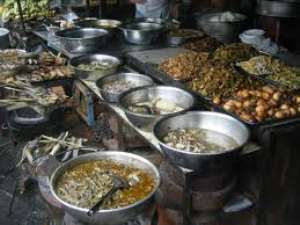
Ho, Oct. 2, GNA - Ghana's earnings from the tourism sector declined from 2.5 billion dollars and 2.6 billion dollars in 2012 and 2013 respectively to 2.1 billion dollars in 2014 down from a projected forecast of 2.9 billion dollars.
Studies have shown that the decline was due mainly to poor food hygiene practices, Professor Emmanuel Kodzo Sakyi, Rector of Ho Polytechnic said.
He said a study in Cape Coast, a 'world Heritage Site Town" in 2011 visited by local and foreign tourists put hygiene safety as the principal criterion over curiosity and price to patronize street foods, found to have 'threatening unacceptable microbial contamination levels.'
He was delivering the welcome address and the purpose of the first National Food Hygiene and Sanitation Conference organized by the Department of Hospitality and Tourism Management, in conjunction with the Faculty of Applied Sciences and Technology of the Polytechnic.
The theme for the two day conference was, 'Food Hygiene, Sanitation and safety in the Post MDG Era.'
'Soyiri (2008), African Journal of Food and Agriculture and Nutrition and Development (2008) Vol.8 (1) also found out that, majority of butchers in the Ashaiman Market in Accra, did not practice safe hygiene standards recommended by the Ghana Food and Drugs Authority and Ghana Standards Board.
The beef samples from that market were found to be contaminated with faecal matter.
Another study conducted into street vending of food at four bus terminals in Kumasi 'from November, 2008 to February 2009, on 60 food samples showed that most ready-to-eat foods in Kumasi were contaminated with enteric bacteria and other food poisoning organisms with bacteria counts higher than the acceptable levels.'
Ghana Medical Journal Special Issues 2009, also talked of 'unacceptable high levels of faecal coliforms in vegetables grown in Accra.
In 'Hygienic Practices among Food Vendors in Educational Institutions in Ghana: The Case of Konongo, Foods Volume 2, Isaac Monney, Dominic Agyei and Wellington Owusu 2003, found that training of food vendors on hygiene, instead of the level of education had significant association with crucial food hygiene practices such as medical examination, hand hygiene and protection of food from flies.
Professor Sakyi said the Ho Polytechnic saw these damning conclusions as a challenge, which required a platform such as the Conference, to rally relevant stakeholders and experts to deal with.
"As a training and research institution, it is the core mandate of the Polytechnic to play a vanguard role in the generation of new ideas through research and share same with policy makers, practitioners and communities at both national and local levels.
'Most importantly, the Polytechnic is a key stakeholder in training professional managers for food and hospitality industry in Ghana. It is our hope that engaging professionals in the food chain would be an opportunity to identify with the problems confronting the industry, diagnose these problems and offer possible solutions.' Professor Sakyi said.
GNA




 We’ll no longer tolerate your empty, unwarranted attacks – TUC blasts Prof Adei
We’ll no longer tolerate your empty, unwarranted attacks – TUC blasts Prof Adei
 Bawumia donates GHc200,000 to support Madina fire victims
Bawumia donates GHc200,000 to support Madina fire victims
 IMF to disburse US$360million third tranche to Ghana without creditors MoU
IMF to disburse US$360million third tranche to Ghana without creditors MoU
 Truck owner share insights into train collision incident
Truck owner share insights into train collision incident
 Paramount chief of Bassare Traditional Area passes on
Paramount chief of Bassare Traditional Area passes on
 Two teachers in court over alleged illegal possession of BECE papers
Two teachers in court over alleged illegal possession of BECE papers
 Sunyani: Victim allegedly shot by traditional warriors appeals for justice
Sunyani: Victim allegedly shot by traditional warriors appeals for justice
 Mahama vows to scrap teacher licensure exams, review Free SHS policy
Mahama vows to scrap teacher licensure exams, review Free SHS policy
 Government will replace burnt Madina shops with a new three-story, 120-store fac...
Government will replace burnt Madina shops with a new three-story, 120-store fac...
